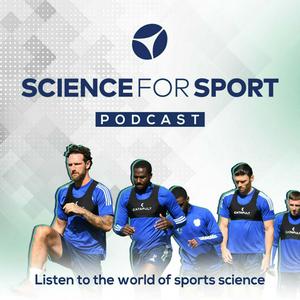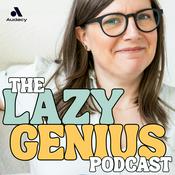305 episodes
- Richard Graves welcomes former England fast bowler Ryan Sidebottom to the Science for Sport Podcast for a wide-ranging conversation on longevity, resilience, and the evolution of elite cricket.
Across a first-class career spanning more than 20 years, Ryan experienced the game at every level — from sweeping floors and laying bricks in the winter to winning a T20 World Cup with England. In this episode, he reflects on how professional cricket changed during his career, why physical preparation became essential for longevity, and how mindset, curiosity, and self-analysis shaped his success.
Ryan speaks openly about setbacks, selection disappointments, returning to the England setup after six years away, and the hard, often unseen work that underpinned his performances. It’s an honest insight into elite performance, long careers, and what really matters behind the scenes.
In this episode you will learn:
How professional cricket evolved from semi-professional roots to a fully supported high-performance environment
Why strength & conditioning became critical to Ryan’s longevity as a fast bowler
How he managed long periods outside the England setup and stayed mentally engaged
The role of self-analysis, questioning, and learning from senior players
What elite environments can learn from England’s 2010 T20 World Cup turnaround
Why curiosity and asking questions accelerate development in elite sport
How mindset, confidence, and preparation influence consistency over time
About Ryan Sidebottom
Ryan Sidebottom is a former England international fast bowler with a first-class career spanning over two decades. He represented England in Test cricket and was part of the 2010 ICC World T20-winning squad. At domestic level, Ryan enjoyed success with Yorkshire and Nottinghamshire, winning multiple County Championship titles and taking over 1,000 career wickets. Since retiring, he has remained closely involved in the game through media, hospitality, and ambassadorial roles, with a growing interest in coaching and player development.
FREE 7d SCIENCE FOR SPORT ACADEMY TRIAL
SIGN UP NOW: https://bit.ly/SFSepisode241
Learn Quicker & More Effectively
Optimise Your Athletes' Recovery
Position Yourself As An Expert To Your Athletes And Naturally Improve Buy-In
Reduce Your Athletes' Injury Ratese
Save 100's Of Dollars A Year That Would Otherwise Be Spent On Books, Courses And More
Improve Your Athletes' Performance
Advance Forward In Your Career, Allowing You To Earn More Money And Work With Elite-Level Athletes
Save Yourself The Stress & Worry Of Constantly Trying To Stay Up-To-Date With Sports Science Research - Behind every high-performance environment are people, personalities, and decisions that shape outcomes. This week on the Science for Sport Podcast, Richard Graves is joined by former England international and Premier League defender Warren Barton, speaking from California.
Warren reflects on a career that spanned very different eras of elite football, from coming through non-league and the famously demanding culture of Wimbledon’s “Crazy Gang”, to becoming a record signing at Newcastle United during the Entertainers era. Across the conversation, Warren offers a rare, first-hand perspective on the psychology of professional sport: rejection, resilience, team identity, leadership, and how elite environments shape behaviour.
The discussion also moves into modern high-performance sport, exploring how man-management, culture, and trust still sit alongside data, technology, and sports science. Warren shares thoughtful insights on coaching, communication, player wellbeing, and why asking an athlete how they feel still matters just as much as what the numbers say.
A wide-ranging, honest conversation that will resonate with practitioners working in elite sport, as well as those interested in the human side of performance.
In this episode you will learn
How early rejection and non-academy pathways can shape resilience and long-term success
Why strong team culture and shared identity can create psychological advantages over more talented opponents
Lessons from Wimbledon’s “Crazy Gang” environment and what modern teams can still learn from it
How elite managers like Kevin Keegan, Kenny Dalglish, and Sir Bobby Robson differed in leadership and man-management
Why man-management remains central to performance, even in data-rich environments
How elite players and coaches balanced intuition, experience, and emerging sports science practices
The importance of trust, togetherness, and players “having each other’s backs” in high-pressure environments
Where modern football may be losing connection with basic human communication
Warren’s perspective on technology, VAR, and how decision-making affects the athlete and fan experience
How coaches can better integrate data with athlete feedback and lived experience
About Warren Barton
Warren Barton is a former England international footballer who played at the highest level of English football during the 1990s. His career included spells at Wimbledon and Newcastle United, where he became part of Kevin Keegan’s iconic “Entertainers” side and captained the club during one of its most influential Premier League eras.
Since retiring from playing, Warren has built a career in broadcasting and coaching, working extensively in the United States as a football analyst and pundit, including coverage of major international tournaments. He holds his UEFA Pro Licence and continues to work across elite football, combining practical experience with a deep understanding of performance, psychology, and leadership.
SIGN UP NOW: https://bit.ly/SFSepisode241
Learn Quicker & More Effectively
Optimise Your Athletes' Recovery
Position Yourself As An Expert To Your Athletes And Naturally Improve Buy-In
Reduce Your Athletes' Injury Ratese
Save 100's Of Dollars A Year That Would Otherwise Be Spent On Books, Courses And More
Improve Your Athletes' Performance
Advance Forward In Your Career, Allowing You To Earn More Money And Work With Elite-Level Athletes
Save Yourself The Stress & Worry Of Constantly Trying To Stay Up-To-Date With Sports Science Research - In this episode of the Science for Sport Podcast, host Richard Graves is joined by John Noonan, a highly experienced performance coach whose career spans elite football, rugby league and union, Winter Olympic sports, and the world of Formula One.
John describes himself as a “gypsy of sport” driven by curiosity, problem-solving, and a deep interest in what actually moves the needle in elite performance. From his early days in football and rugby to supporting drivers in the most intense performance environment in global sport, John shares how his thinking has evolved beyond programmes and protocols, towards relationships, skill execution, and consistency under pressure.
The conversation explores how elite performers prepare for the biggest moments, why world-class athletes are “uncommonly consistent,” and how performance staff can better integrate physical, technical, and psychological elements to support athletes when it matters most. John also lifts the lid on working in motorsport, a sport decided by millimetres, milliseconds, and mental control, and reflects on burnout, travel fatigue, and managing performance across relentless global calendars.
This is a thoughtful, experience-led discussion for practitioners working at the top end of elite sport, as well as anyone fascinated by what separates the very best from the rest.
In this episode you will learn
Why elite performance is ultimately a people business, not a programming problem
How working across multiple sports shapes better decision-making as a performance coach
What “uncommon consistency” really looks like in world-class athletes
Why skill execution, not physical capacity, often determines success at the highest level
How performance staff can influence athletes who don’t need to listen to them
Lessons from Formula One on pressure, precision, and decision-making under fatigue
How interdisciplinary teams can improve performance communication in real time
Practical insights into managing burnout, travel, jet lag, and long competitive calendars
About John Noonan
John Noonan is a performance coach and sports scientist with over two decades of experience working across elite sport. His background includes roles in professional football, rugby league and union, Winter Olympic sports, and long-term work within Formula One.
Now the founder of Noonan Performance, John works with elite athletes and teams to improve performance through smarter physical preparation, better communication, and a strong emphasis on skill execution and decision-making under pressure. He is known for his relationship-led approach, his ability to work across disciplines, and his focus on solving the right performance problems.
FREE 7d SCIENCE FOR SPORT ACADEMY TRIAL
SIGN UP NOW: https://bit.ly/SFSepisode241
Learn Quicker & More Effectively
Optimise Your Athletes' Recovery
Position Yourself As An Expert To Your Athletes And Naturally Improve Buy-In
Reduce Your Athletes' Injury Ratese
Save 100's Of Dollars A Year That Would Otherwise Be Spent On Books, Courses And More
Improve Your Athletes' Performance
Advance Forward In Your Career, Allowing You To Earn More Money And Work With Elite-Level Athletes
Save Yourself The Stress & Worry Of Constantly Trying To Stay Up-To-Date With Sports Science Research - This week on the Science for Sport Podcast, Richard Graves is joined by Rachel Muse, one of the leading performance chefs working with elite athletes across professional sport.Rachel is the founder of Talk Eat Laugh, a specialist performance-chef service supporting athletes in their own homes. Her work bridges the gap between performance nutrition science and real-life eating habits, ensuring athletes follow precise nutritional plans without meals becoming clinical, restrictive, or culturally disconnected.In this episode, Rachel shares her unconventional journey from mathematics graduate to elite performance chef, and explains how chefs, nutritionists, and sports science teams work together to deliver periodised nutrition away from the training ground. The conversation explores how macronutrient targets are delivered in practice, how food preferences and cultural background shape compliance, and why fuelling the brain is just as important as fuelling the body.This is a rare insight into a part of the performance system that is often overlooked, but critical to recovery, consistency, and late-game performance.
In this episode, you will learn
What periodised nutrition actually means in practice, beyond the theory
How performance chefs work from nutritionist-led macro prescriptions
Why chefs should not act as nutritionists, and where the professional boundaries sit
How to deliver exact macronutrient targets without meals becoming boring or restrictive
The role of carbohydrates in sustaining physical and cognitive performance late in matchesHow cultural background and food identity influence nutritional compliance
Why elite performance nutrition is as much about psychology and trust as it is science
What “success” really looks like when supporting elite athletes away from the club environment
About Rachel Muse
Rachel Muse is a performance chef with a background spanning elite hospitality, private households, and professional sport. After an unconventional route into the culinary world, she founded Talk Eat Laugh, a performance-chef business supporting elite athletes across football, rugby, swimming, and motorsport.Rachel works closely with performance nutritionists and sports science teams to deliver highly specific nutritional strategies in athletes’ home environments. Known for her emphasis on collaboration, precision, privacy, and cultural understanding, Rachel specialises in translating complex nutrition plans into meals athletes genuinely want to eat, consistently and compliantly.You can follow Rachel on LinkedIn or find Talk Eat Laugh on Instagram for insights into performance food done properly.
FREE 7d SCIENCE FOR SPORT ACADEMY TRIAL
SIGN UP NOW: https://bit.ly/SFSepisode241
Learn Quicker & More Effectively
Optimise Your Athletes' Recovery
Position Yourself As An Expert To Your Athletes And Naturally Improve Buy-In
Reduce Your Athletes' Injury Ratese
Save 100's Of Dollars A Year That Would Otherwise Be Spent On Books, Courses And More
Improve Your Athletes' Performance
Advance Forward In Your Career, Allowing You To Earn More Money And Work With Elite-Level Athletes
Save Yourself The Stress & Worry Of Constantly Trying To Stay Up-To-Date With Sports Science Research - Creatine is now one of the most widely used and well-researched supplements in elite sport — but few people know the story of how it first made its way into Olympic performance programmes.
In this episode of the Science for Sport Podcast, Richard Graves sits down with Steven Jennings, one of the key figures behind the early adoption of creatine in elite sport, to unpack a remarkable story that begins long before creatine was common knowledge.
Steven takes us back to the early 1990s — a pre-internet era where sports nutrition research travelled slowly, secrecy mattered, and a single kilogram of creatine played a role in reshaping performance preparation ahead of the Barcelona 1992 Olympic Games. From working directly with pioneering researchers at the Karolinska Institute to navigating Olympic-level scrutiny, this is a rare, first-hand account of how science moved from the lab to the field.
Beyond performance sport, the conversation also looks forward. Steven shares why he believes we are only just beginning to understand creatine’s wider potential — from cognition and ageing to plant-based diets and long-term health.
This is an essential listen for practitioners who want to understand not just what works in performance nutrition, but how evidence, trust, regulation, and timing shape real-world impact.
In this episode you will learn
What creatine actually is and how it works at a cellular level
How early research in the early 1990s changed elite sport preparation
Steven’s role in bringing creatine into Olympic sport ahead of Barcelona 1992
Why creatine was (and still is) legal, safe, and fundamentally different from banned substances
How creatine became associated with repeated high-intensity performance and recovery
Why creatine research is now expanding beyond sport into cognition, ageing, and health
Why we may still be “scratching the surface” of creatine’s full potential
About Steven Jennings
Steven Jennings is a sports nutrition entrepreneur and former professional cyclist who played a pivotal role in the early commercialisation of creatine for elite sport. In the early 1990s, he worked directly with leading researchers from the Karolinska Institute to help translate groundbreaking creatine research into real-world Olympic performance programmes.
Over the past three decades, Steven has remained closely connected to the evolution of creatine research, from elite performance applications to emerging work in health, cognition, and ageing. Today, he continues to focus on education, innovation, and the future direction of creatine science.
FREE 7d SCIENCE FOR SPORT ACADEMY TRIAL
SIGN UP NOW: https://bit.ly/SFSepisode241
Learn Quicker & More Effectively
Optimise Your Athletes' Recovery
Position Yourself As An Expert To Your Athletes And Naturally Improve Buy-In
Reduce Your Athletes' Injury Ratese
Save 100's Of Dollars A Year That Would Otherwise Be Spent On Books, Courses And More
Improve Your Athletes' Performance
Advance Forward In Your Career, Allowing You To Earn More Money And Work With Elite-Level Athletes
Save Yourself The Stress & Worry Of Constantly Trying To Stay Up-To-Date With Sports Science Research
More Education podcasts
Trending Education podcasts
About Science for Sport Podcast
Discover the Secrets Behind Elite Performance.
Join us on the Science for Sport Podcast, where every episode dives into the cutting-edge world of sports science and the untold stories behind the best athletes and teams on the planet.
Hosted by Richard Graves, we bring you exclusive insights from elite athletes, world-class coaches, and leading sports scientists who are shaping the future of global sport.
This isn’t just another sports podcast—this is your backstage pass to:
- The science powering record-breaking performances.
- The trends, challenges, and breakthroughs redefining the game.
- Mastering the balance of art and science in coaching.
Whether you’re a sports scientist, coach, physio, nutritionist, teacher, or just a passionate sports fan, this is your chance to learn from the pros and stay ahead of the curve.
Tune in every Monday and uncover what it takes to make the best, better.
Podcast websiteListen to Science for Sport Podcast, Everyday Māori and many other podcasts from around the world with the radio.net app

Get the free radio.net app
- Stations and podcasts to bookmark
- Stream via Wi-Fi or Bluetooth
- Supports Carplay & Android Auto
- Many other app features
Get the free radio.net app
- Stations and podcasts to bookmark
- Stream via Wi-Fi or Bluetooth
- Supports Carplay & Android Auto
- Many other app features


Science for Sport Podcast
Scan code,
download the app,
start listening.
download the app,
start listening.







































